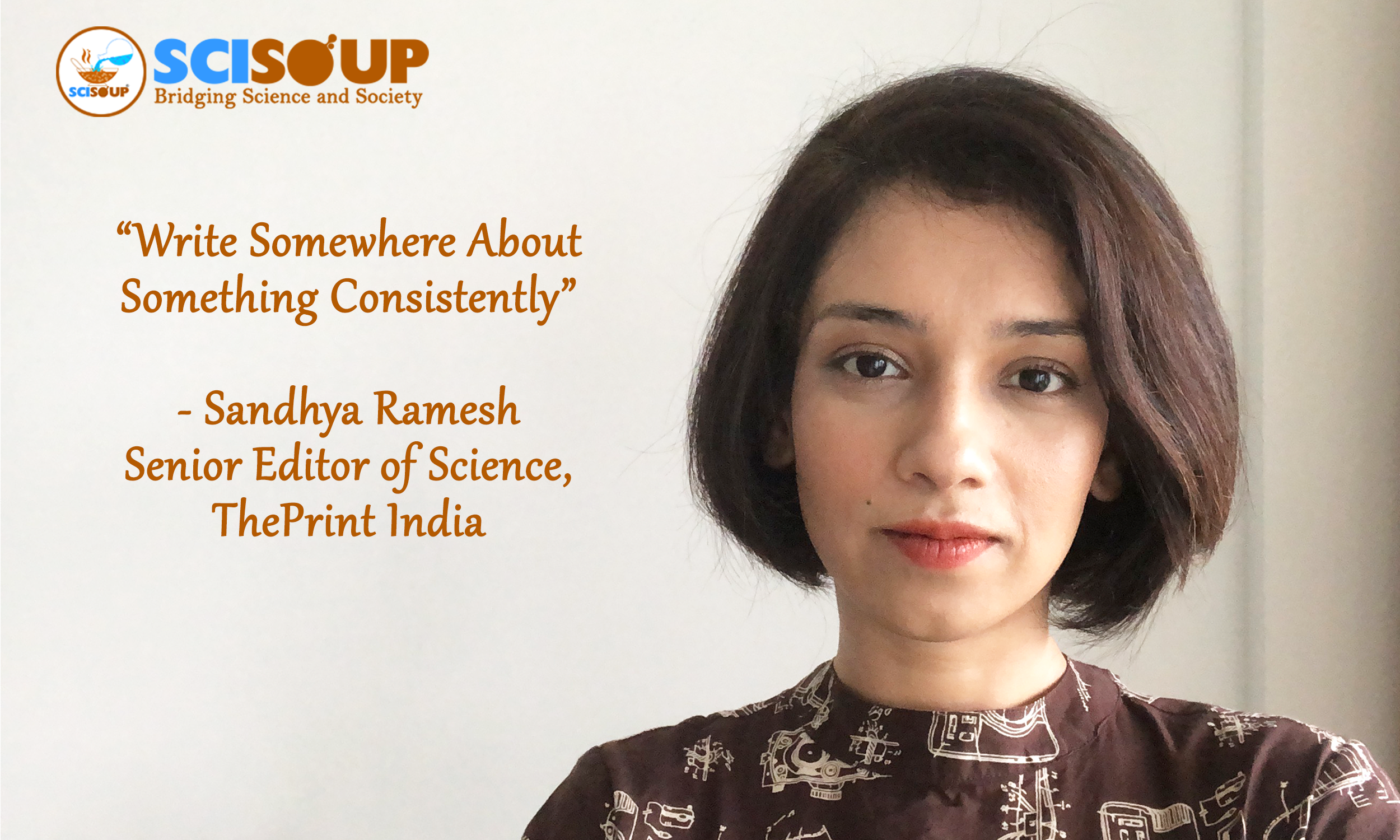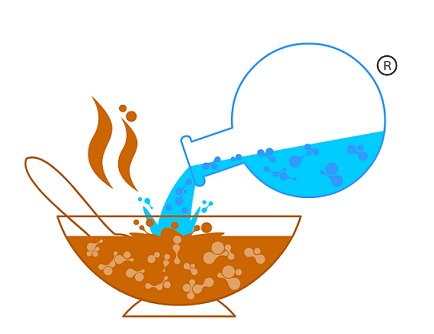
"I found a lot of opportunity to write on Quora, having been a very early adopter of the platform, way back in 2010-2011. My writings here got noticed by some wonderful folks in the media, and I started writing as a freelancer while working in IT. I began writing for The Wire, Digit Magazine, Mint, Planetary Society, Hindustan Times, etc."
APR 26, 2023 | BY DIVYA P. KUMAR AND RATNESHWAR THAKUR
In this SciSoup’s Career Development and Mentoring Blog Series 2023, Sandhya Ramesh, Senior Editor of Science, ThePrint India, is sharing her views and experiences with SciSoup about her journey, responsibilities in the current position, her inspiration and challenges of the science journalism, and more. She writes text stories and creates videos about science and research.
1) Could you briefly introduce yourself to the audience?
I am the senior editor of science at ThePrint India. I am an electronics engineer with a computer science masters, but I’ve always been writing about science and astronomy since school times. I’ve been writing professionally since 2015 and with ThePrint since 2018.
I am a big fan of music, and play western classical on violin and piano. I love learning new languages. I also write about science for children.
2) Describe your responsibilities in the current position that you hold.
I scout for new scientific research that is about to be/has been published across the world. I report on them and also do long feature stories. I work with a small team on science stories. I travel across the country (and sometimes outside) looking for interesting feature stories and videos.
I do explainer videos on an interesting scientific finding every week on my YouTube show Pure Science with Sandhya Ramesh.
I also assist our editorial team in commissioning pitches and stories from freelancers, as well as work with them through the process.
3) How was your transition from a B.E. holder to a science communicator? What inspired you, and how did you get started?
It was surprising, serendipitous, and life-changing. Through school and college, I have been involved in institutional magazines and newspapers, and was also the editor of our engineering college magazine. I loved writing about astronomy specifically, but also earth sciences. I had wanted to study planetary science at one point, maybe I would get an opportunity in the future sometime.
I found a lot of opportunity to write on Quora, having been a very early adopter of the platform, way back in 2010-2011. My writings here got noticed by some wonderful folks in the media, and I started writing as a freelancer while working in IT. I began writing for The Wire, Digit Magazine, Mint, Planetary Society, Hindustan Times, etc.
In 2018, I transitioned into a full-time role in journalism. I am extremely grateful to have finally found what I think I will genuinely love doing all my life.
Overall, this exercise has been truly humbling and made me strong enough to get up after each fall.
4) What are the challenges that exist in your field?
A major one is sensational stories that grab attention by either misrepresenting studies or falling for cleverly publicized studies. These are tricky to debunk because they tend to get circulated far and wide before corrections come along, and people buy into the findings because not every lay reader knows how to evaluate dense research papers.
There’s also misinformation, and it was evidently extremely rampant during covid. When such health challenges occur at such large scales, wrong information can be quite dangerous. It is often quite hard to be heard over the din.
Media as an industry is also not well known for paying well anywhere unfortunately.
5) Can you describe your approach to researching and reporting on scientific topics and how challenging it is to communicate science to the general public?
I track journals and am on many mailing lists. So I get a list of papers that have either just been published or are embargoed to be. I also have lists on Twitter and follow a fair number of scientists who tend to talk about new findings in their fields. Institution mailing lists also really help.
Once a story is decided, it is important to go through the whole paper and understand the methodology of the study. Then I talk to the authors of the paper as well as independent experts in the field. Additionally, writing a story also requires understanding a lot of concepts that a journalist might not be familiar with, so nearly every study requires going through 3 to 5 other papers at least.
The challenge lies in opening up concepts that scientists are familiar with but not people without academic training. So it takes a lot of patience, there are no quick and easy stories at all.
6) You have been communicating science both via print and visual media; how is it different, and what specific preparations do you make?
The way the stories in print and in video are narrated is quite different. Writing is formal while videos are more conversational. I am relaxed about grammar, for example, in videos because I’m improvising beyond my script, but this can’t fly with written pieces.
While writing typically involves just knowing about the subject and having a reasonably proficient command over language, shooting videos by oneself requires understanding of all the paraphernalia that comes with it. It took a lot of trial and error to figure out lighting and sound and background, and I am still not happy with any of those currently!
Speaking in front of the camera also takes some getting used to for someone who is just starting out. It’s not easy seeing your own face and listening to your own voice.
On the positive side, there are several visuals that can be shown in videos, making concepts easier to convey. So it’s also important to pick stories accordingly – if something has promising visuals, it would typically make for a good video.
7) Could you please share the future prospects of the career path you have chosen?
This is a tough one. Science journalism in India is still quite nascent, and how it will progress in the country is going to be interesting to see. In media, especially after Covid, there has been a surge of interest in science and research. So I foresee many science journalists entering the field over the next few years. And we need as many as we can get.
In some places like US, the market is hyper competitive. On the contrary, places like Canada lack any science journalism. This is a media limitation.
There is independent writing and freelancing which people these days typically do from anywhere. There are also independent creators who both make videos as well as do newsletter subscriptions.
Lastly, there are also dedicated science magazines, podcasts, shows, and more, many of which also require people with good science communication/journalism skills for research.
8) If you were asked to provide 3- tips/ guidance to aspirants who would like to follow a similar career path, what would you suggest?
- Write somewhere about something consistently.
- Figure out if you want to specialize in a subject, esp. if you have a background in it, or would you prefer to be a general storyteller?
- Read other stories to figure out how to spot good stories in real life. Every science story from India, even if on the same subject, tends to be different. There are countless angles to explore a story from.
Disclaimer - SciSoup claims no competing interest. The opinions expressed by participants in this blog are solely their own and do not necessarily reflect the views or opinions of the blog creators or its affiliates. The purpose of this blog series is to raise awareness about non-academic careers and provide mentoring insights.

Send your opinions, questions, and suggestions for future column topics and stories - to scisoup@gmail.com and engage with us on